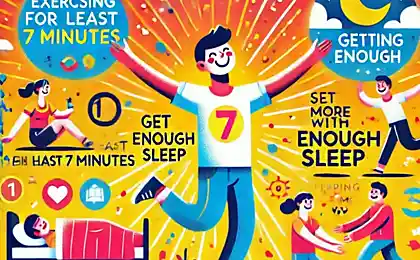546
4 things that will make You happier at work
Sometimes your job can be a trying routine, but it is not always possible to leave her. So what to do to become happier in your job? In this article we describe the results of studies that would help make work more meaningful and make you happier in the office.

Change the description of your work
Washing floors in a hospital is hardly anyone's dream job. Emptying baskets of trash in hospital wards is not felt as something special or important lesson. But what if you had the same responsibilities and would be able to look at your work in a broader context?
"I help the hospital function better, and my work allows patients to recover and return to their families". The study compared workers who saw their work only the paycheck, those who looked deeper. And those who saw in his cleaning to the health of the patients felt their work as more meaningful.
From the book "Select the desired life: a reasonable way to happiness" (Choose the Life You Want: The Mindful Way to Happiness): Reznicki and Dutton followed a group of hospital cleaners, and found that some of them perceive their activity only as a job to receive a paycheck and described it as boring and pointless. The other group perceived the same work as a vocation, and the work hours were for them interesting and meaningful. This second group of cleaners did everything wrong, as the first group. They interacted more with nurses, patients, visitors, trying to people with whom they came in contact, felt better. Overall, they saw their work in its broader context. They do not just clean the chamber and removed the debris, but contributed to the health of patients and the functioning of the hospital.
How do you see your job? Is it possible to see it as something better, although without the self-deception that would make you happier?
Pay attention to the results
Work in a call center can be a thankless and tedious. That can help people to feel better in the process of endless dialing and frequent complaints? Professor, Wharton business school, Adam Grant, conducted a study, trying to motivate the staff of a University call center. He managed to raise the motivation of employees without raises, promotions, bonuses and increases in salary. How? He showed them letters written by grateful students who had received scholarships through the efforts of the team of the call center. What spurred their motivation? Conversations with the students.
From the book "Give and take: a revolutionary approach to success" (Give and Take: A Revolutionary Approach to Success): When employees call center spoke personally with the recipient of the scholarship, they showed even more enthusiasm. The average employee has doubled performance on calls and minutes of conversation per week. Through more hard work staff have covered more graduates, the result of which was obtained at 144% more donations from alumni each week. Even more strikingly, revenue quintupled: on average it was $412 before meeting the scholarship recipient and more than $2,000 after.
You are cut off from the results of your work? Is there a way for you to keep better track of exactly how work helps clients?
Use your strengths
You probably perform a number of actions at work, and some of these responsibilities could be shared with other team members. Do you have the ability to select what tasks you decide, and what can come from your colleagues? If so, you can become much happier. Don't choose tasks that are done quickly or easily. Grasp everything you are good.
Research shows that to do what you are good, is the key to happiness Americans experience the more positive emotions, the more you use your strengths. The more hours per day adults use their strengths, the more they are energetic, you feel rested, happy, smiling, learning something interesting and feeling respectful attitude.
Work, allowing you to use your talents makes you consistently happier at the office: the more personal effort has been applied in the workplace, the more positive experience at work. The study showed that strength of character means a lot in any professional environment. Daily use of his strengths for a long time can make you significantly happier.
From the book "the happiness Advantage: the seven principles of positive psychology that drive the success and effectiveness at work" (The Happiness Advantage: The Seven Principles of Positive Psychology That Fuel Success and Performance at Work): When 577 volunteers were asked to use one of their strengths in new ways every day during the week, they became significantly happier and less depressed than the control group. And these benefits were long-lasting: even after the end of the experiment, a month later, their happiness level has remained high. What are the duties in which you are weak, you could take someone else? What would you do to capitalize on their strengths?
Invest
You can learn a lot about love to their work, looking for furniture from IKEA. Seriously. Why is this furniture so popular? Research shows we love things more when we invest in them a part of yourself. You have collected a side table with his own hands. It's your creation. That's what the mysterious force Swedish furniture. In my interview with Professor Dan Ariely, author of the book "Predictable irrationality: the hidden forces that determine our solutions" (Predictably Irrational: The Hidden Forces That Shape Our Decisions) he explained: "This is a great example of something irrational but wonderful. We have discovered that in the moment when you put a part of themselves into something, you start to overestimate.
My personal experience started with IKEA furniture, so we called it the IKEA effect. It turned out that I'm not good at assembling furniture and this took me a lot of time. I made every possible mistake. But I found that after assembling the piece of furniture of rather poor quality, I was incredibly proud and continued to carry it with me from city to city, although this was not objectively justified." If I bring a random child in your house and tell you to keep it, you agree. If it was your child you would have kept it, and indeed your happiness would depend on his well-being. As explained by Dan, investing in something, we care more about it. Invest more in your career and you will find that like my work.
P. S. And remember, just changing your mind — together we change the world! ©
Source: blog.mbaconsult.ru/blog/personal/lyubite-to-chto-delaete-4-veshchi-kotorye-sdelayut-vas-schastlivee-na-rabote/?sphrase_id=39713

Change the description of your work
Washing floors in a hospital is hardly anyone's dream job. Emptying baskets of trash in hospital wards is not felt as something special or important lesson. But what if you had the same responsibilities and would be able to look at your work in a broader context?
"I help the hospital function better, and my work allows patients to recover and return to their families". The study compared workers who saw their work only the paycheck, those who looked deeper. And those who saw in his cleaning to the health of the patients felt their work as more meaningful.
From the book "Select the desired life: a reasonable way to happiness" (Choose the Life You Want: The Mindful Way to Happiness): Reznicki and Dutton followed a group of hospital cleaners, and found that some of them perceive their activity only as a job to receive a paycheck and described it as boring and pointless. The other group perceived the same work as a vocation, and the work hours were for them interesting and meaningful. This second group of cleaners did everything wrong, as the first group. They interacted more with nurses, patients, visitors, trying to people with whom they came in contact, felt better. Overall, they saw their work in its broader context. They do not just clean the chamber and removed the debris, but contributed to the health of patients and the functioning of the hospital.
How do you see your job? Is it possible to see it as something better, although without the self-deception that would make you happier?
Pay attention to the results
Work in a call center can be a thankless and tedious. That can help people to feel better in the process of endless dialing and frequent complaints? Professor, Wharton business school, Adam Grant, conducted a study, trying to motivate the staff of a University call center. He managed to raise the motivation of employees without raises, promotions, bonuses and increases in salary. How? He showed them letters written by grateful students who had received scholarships through the efforts of the team of the call center. What spurred their motivation? Conversations with the students.
From the book "Give and take: a revolutionary approach to success" (Give and Take: A Revolutionary Approach to Success): When employees call center spoke personally with the recipient of the scholarship, they showed even more enthusiasm. The average employee has doubled performance on calls and minutes of conversation per week. Through more hard work staff have covered more graduates, the result of which was obtained at 144% more donations from alumni each week. Even more strikingly, revenue quintupled: on average it was $412 before meeting the scholarship recipient and more than $2,000 after.
You are cut off from the results of your work? Is there a way for you to keep better track of exactly how work helps clients?
Use your strengths
You probably perform a number of actions at work, and some of these responsibilities could be shared with other team members. Do you have the ability to select what tasks you decide, and what can come from your colleagues? If so, you can become much happier. Don't choose tasks that are done quickly or easily. Grasp everything you are good.
Research shows that to do what you are good, is the key to happiness Americans experience the more positive emotions, the more you use your strengths. The more hours per day adults use their strengths, the more they are energetic, you feel rested, happy, smiling, learning something interesting and feeling respectful attitude.
Work, allowing you to use your talents makes you consistently happier at the office: the more personal effort has been applied in the workplace, the more positive experience at work. The study showed that strength of character means a lot in any professional environment. Daily use of his strengths for a long time can make you significantly happier.
From the book "the happiness Advantage: the seven principles of positive psychology that drive the success and effectiveness at work" (The Happiness Advantage: The Seven Principles of Positive Psychology That Fuel Success and Performance at Work): When 577 volunteers were asked to use one of their strengths in new ways every day during the week, they became significantly happier and less depressed than the control group. And these benefits were long-lasting: even after the end of the experiment, a month later, their happiness level has remained high. What are the duties in which you are weak, you could take someone else? What would you do to capitalize on their strengths?
Invest
You can learn a lot about love to their work, looking for furniture from IKEA. Seriously. Why is this furniture so popular? Research shows we love things more when we invest in them a part of yourself. You have collected a side table with his own hands. It's your creation. That's what the mysterious force Swedish furniture. In my interview with Professor Dan Ariely, author of the book "Predictable irrationality: the hidden forces that determine our solutions" (Predictably Irrational: The Hidden Forces That Shape Our Decisions) he explained: "This is a great example of something irrational but wonderful. We have discovered that in the moment when you put a part of themselves into something, you start to overestimate.
My personal experience started with IKEA furniture, so we called it the IKEA effect. It turned out that I'm not good at assembling furniture and this took me a lot of time. I made every possible mistake. But I found that after assembling the piece of furniture of rather poor quality, I was incredibly proud and continued to carry it with me from city to city, although this was not objectively justified." If I bring a random child in your house and tell you to keep it, you agree. If it was your child you would have kept it, and indeed your happiness would depend on his well-being. As explained by Dan, investing in something, we care more about it. Invest more in your career and you will find that like my work.
P. S. And remember, just changing your mind — together we change the world! ©
Source: blog.mbaconsult.ru/blog/personal/lyubite-to-chto-delaete-4-veshchi-kotorye-sdelayut-vas-schastlivee-na-rabote/?sphrase_id=39713























